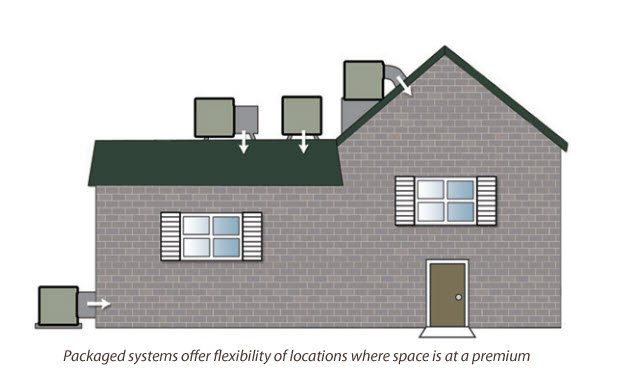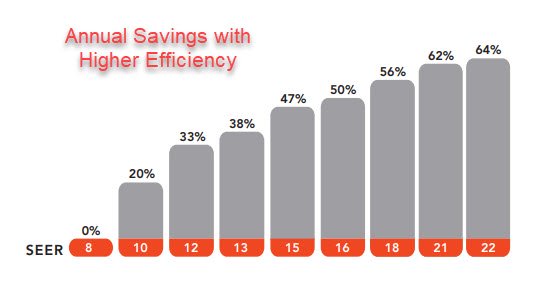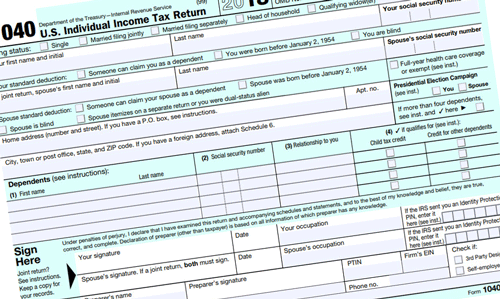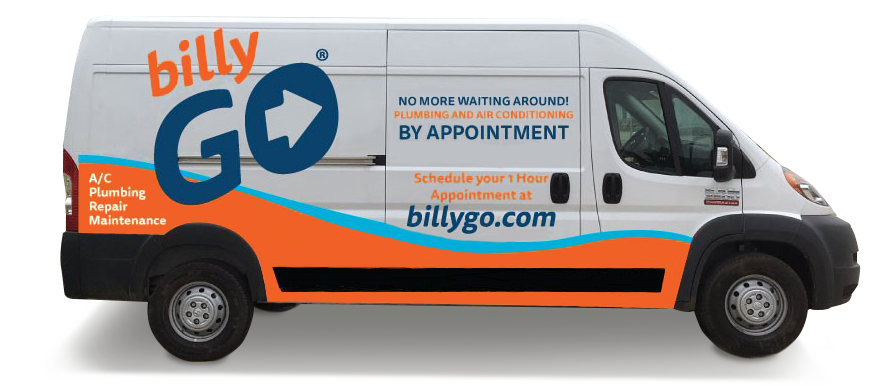Knowing how to choose which air conditioner to install in your home can be the key to happiness. That’s certainly true in many parts of the country, where scorching summer heat makes air conditioning nearly as essential to survival as food and water.
But although the need for air conditioning and heating in this world is simple, it’s not as simple when you need to choose the right air conditioning unit for your home. There are important factors to consider, including the type and size of the AC unit, the efficiency rating, the warranty, as well as the financial incentives that can reduce the overall cost.
The Basics of Central Air Conditioning
In the middle of August, cool air blowing from a vent in your living room can seem almost magical. But the question of “How does air conditioning work?” is answered with science rather than something like pulling a rabbit out of a hat.
Central air conditioning works much like a refrigerator in your home. When warm air blows across an evaporator coil in the air conditioning unit, the heat energy in the air is transferred to the refrigerant inside the coil. A blower pushes the refreshing, cooler air throughout your home while the heat collected by the condenser stays outside your home.
Finding Your Type: Which Unit is Right for My Home?
A central air conditioner comes in two types:
 Split System – With this type of AC unit, the condenser and compressor are placed outside the home and the evaporator is inside the home. In homes that have a furnace but no air conditioner, this is an economical choice. It is also the most common central cooling system.
Split System – With this type of AC unit, the condenser and compressor are placed outside the home and the evaporator is inside the home. In homes that have a furnace but no air conditioner, this is an economical choice. It is also the most common central cooling system.- Packaged System – With this system, the central air conditioner, evaporator, condenser and compressor are in one metal box or cabinet, which is most likely placed on a roof or concrete slab next to a home. The packaged system eliminates the need for a separate furnace.
Ask your AC professional which is right for your home.
Finding Your Match: What Size Unit Do I Need?
Bigger isn’t always better. In fact, an air conditioning unit that is too large for a particular space is not only inefficient, it can make a room uncomfortable. Air conditioning units remove heat and humidity from a room, but if an oversized AC unit cools the room before the humidity is removed, the air can feel damp and clammy.
What’s best for you is what fits your home. The government’s EnergyStar website offers both a calculation tool and a chart of guidelines for the size of a home and the recommended cooling capacity of the air conditioning unit.
A properly trained AC technician can also help you determine the size that is right for your home. He or she can perform a load calculation, which determines the size of the AC unit that is proper for your home.
Efficiency and Its Effect on Your Wallet
Your dad might have annoyed you with sayings like “shut the door, we’re not cooling the whole neighborhood,” but he did have a good reason to say it. According to the California Energy Commission, heating and cooling account for nearly half — roughly 45 percent — of all energy costs. The more efficient an air conditioning unit is, the less energy it will require to do its job, making it cost less to operate.
But when you’re deciding how to choose a central air conditioner for your home, how do you know which AC units are the most efficient? The efficiency of a heating, ventilation and air conditioning unit (HVAC unit) is measured by SEER, an acronym for Seasonal Energy Efficiency Rating.
Getting to Know the SEER Rating
 The SEER is the ratio of the total cooling output of an air conditioner over a season to the total amount of energy consumed to do the job. Some details about SEER:
The SEER is the ratio of the total cooling output of an air conditioner over a season to the total amount of energy consumed to do the job. Some details about SEER:
- The higher the SEER rating, the more efficiently a unit will operate.
- Many years ago, it was not uncommon to find AC units with SEER ratings of 6-10, but all new air conditioning units in the U.S. now must have a minimum SEER rating of 14.
- Some AC units now have SEER ratings of 22 or higher.
Is a Higher SEER Rating Always the Best Choice?
Air conditioning units with higher SEER ratings can be quite a bit more expensive than units with lower SEER ratings. But considering the lifespan of a central air conditioner is about 15 years, the extra cost up front can be regained through annual energy savings.
There’s more to consider, however. The value of the more expensive, higher-SEER models also depends on how much you will use the HVAC system. Some people, for example, will set a home’s thermostat at 75 degrees in the peak summer months while others will set it at 70. For the home with the lower thermostat setting, and therefore a higher demand of the AC unit, a higher SEER rating offers more energy savings.
The truth is that there is no “one size fits all” solution when choosing a central air conditioner for your home. But there are some helpful resources for determining your potential SEER efficiency savings:
- The energy.gov website offers this Efficiency Savings Calculator to download. It provides good instant calculations but is not as user friendly as it could be.
- This SEER Energy Savings Calculator from seersavings.org is much easier to use and is just as fast.
How Does My Choice Impact the Environment?
Everyone can help the environment by raising their home’s thermostat temperature by a degree or two in the summer and lowering it by a degree or two in the winter. But even if the highest-SEER air conditioning units are not right for you, simply replacing any old unit will allow you to help the environment. That’s because today’s heating and air conditioning units are more efficient than those of 10 or 20 years ago.
The U.S. Department of Energy estimates that in an average home, air conditioning consumes more than 2,000 kilowatt-hours of electricity per year, causing power plants to emit about 3,500 pounds of carbon dioxide and 31 pounds of sulfur dioxide. Even if your old air conditioner is only 10 years old, you can cut energy usage by up to 40 percent with a new model. Whatever choice you make in switching to a new AC unit, it can be considered a “green” decision.
A Few More Things to Consider
- Warranty – The duration of the warranty is important, along with the terms. For example, some warranties can be voided if someone other than a certified licensed technician makes repairs to the unit. In addition to the warranty on the HVAC system, you’ll want to ask about the warranty for the new A/C installation.
 Noise levels – Air conditioning units all make some noise when they operate, but some are quieter than others. An HVAC system with a variable-speed blower will be quieter because it doesn’t have to run at high speed all the time. (It also uses less energy). Another new technology you can ask about is noise-reducing fan blades.
Noise levels – Air conditioning units all make some noise when they operate, but some are quieter than others. An HVAC system with a variable-speed blower will be quieter because it doesn’t have to run at high speed all the time. (It also uses less energy). Another new technology you can ask about is noise-reducing fan blades.- Financial Incentives – Because newer air conditioning and heating systems save energy, government tax credits are often available for those who decide on an air conditioning replacement. Those tax credits can be found online, and professionals in air conditioning installation will also know about them.
CONCLUSION
We all love those days when the weather is absolutely perfect, but there’s a reason why central heating and air conditioning systems are so prevalent in our lives. We spend a lot of time inside, and more than 75 percent of U.S. homes have air conditioning and 90 percent of new homes are constructed with central air conditioning.
When it’s time for a new air conditioning unit, remember these things:
- Find the right fit. Decide on the type of HVAC system that is right for your home and get the correct size. If there’s any doubt, have an AC professional perform a load calculation.
- Consider the SEER rating. Weigh how much the energy savings will offset the cost of a higher-efficiency unit.
- Check on the warranty. Although new HVAC units are designed to have long lifespans, you want the peace of mind of a good warranty.
- Know your installer. Check to make sure your A/C installation technician is certified by the manufacturer of your new HVAC system.
With these tips, you can feel confident as you consider how to choose a central air conditioner. Are you ready to make your home, and your world, a little more comfortable?


